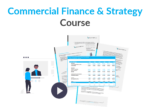
How To Make The Move From Audit To Asset Management?
A lot of my fellow audit colleagues would continuously fret over whether they could escape the chains of audit into something seemingly more lucrative and exciting such as Asset Management.
If you’ve explored your accounting & audit exit opportunities … and you’re sure Asset Management is what you want … then it’s absolutely possible, but you need to keep your cool and be patient.
So, when’s the best time to leave Audit?
Don’t panic and quit halfway through your Audit grad scheme.
If you leave before nailing your accounting qualification, you’ll likely have gone through the pain of doing your exams and lower level associate crap/work, only to leave before you fully time-qualify and start to gain any real managerial and commercial experience.
By sticking around to complete your 3-years in Audit you’ll give yourself time to secure the right experiences and network your way in.
So what exactly are Asset Management firms looking for in new recruits?
First things first, you’ll need to demonstrate a real interest in asset management.
Take a step back and ask yourself, what actually is asset management?
It’s about administering the investment money of wealthy clients through securities such as equity, derivatives or bonds. So, your best bet is to literally put your money where your mouth is and start investing.
Put this on your CV/Resume.
[CAVEAT: Please do your research first and don’t be throwing all your money into cryptokitties straight away].
Take the time to learn about the Financial Markets, something Audit is often removed from.
Your aim is to get the confidence to talk to anyone about markets and the trends that affect portfolio value. Remind yourself of Economic theory.
Many people say they invest in equities, gold, etc. but often don’t have a scooby how the underlying market mechanics work! It’s crucial that if you’re asked to explain your investment rationale in an interview, that you have a clear answer.
I know this because I got to the interview stage at a Hedge Fund to be a Junior Portfolio Manager.
I’d done my research, rehearsed my pitch down to a ‘T’, and the interviewer was loving it (as was I, in this smoky cigar-filled basement of a Private Member’s club in Central London).
I fell short of getting the job because I wanted to leave after 2 years in Audit (just as you may be thinking of doing), which meant needing the Hedge Fund to sign-off the last year of my time qualification which, to my misery, they couldn’t do.
I had to seriously weigh-up whether to treat my 2 years in Audit as a sunk cost (ha! I’ll always be an Accountant), or wait 12 months and time quality.
I figured placing all my eggs in the Hedge Fund basket would close more doors than I felt comfortable with, and if I got this interview now I could certainly get it again, so I ultimately decided to stay on to time quality.
It was the best decision I made, as I’ve since moved on to other industries which were only available to me as a qualified Accountant.
If you need a refresher or are interested in other learning about financial markets you’ve had no exposure to before, then – and you probably know it already – Investopedia.com will be your best friend. Zerohedge.com is also a gold mine for general financial market trends, opinions and current news. By the way, if you’re lucky enough to purchase your first home, it’s worth mentioning in the interview, but unless you have a property portfolio, it won’t be a hugely convincing topic of your “passion” for investing.
What are my chances coming out of Audit?
An advantage you’ll likely have over your competitors also going for Junior Asset Management roles from other walks of life – you’ll have an ACA/CA/CPA under your belt through Audit.
It demonstrates a solid understanding of financials, company performance and (perhaps, unfortunately) also shows you can handle long hours, pressure and stressful situations/clients – all of which make you a suitable candidate for Asset Management
If you’re fortunate enough to already be involved in the audits of Asset Management companies – or can network your way in – then you’ll have an opportunity to learn about the industry from the inside and gain exposure to your potential future employers. Another way to show you’re driven to get into Asset Management would be to start the CFA qualification whilst still in Audit.
Let me be clear…
The CFA is certainly not for everyone trying to escape Audit (and indeed, 9x out of 10 I don’t think the CFA is worth it … I’ll write more on the CFA in another post soon),but it ACTUALLY IS what an Asset Management firms require you to pass to be able to become a Portfolio Manager. Starting it early will prove your genuine interest and commitment, however, it’s not for the faint-hearted. Just put “CFA Level X in progress” on your CV/Resume whilst you are applying.
A few ex-colleagues of mine did manage to gain some leverage in the recruitment process by doing the CFA, but it’s certainly not a sure-fire way in.
So what specific skills should you emphasize to break into Asset Management?
They want candidates with an analytical & financial modelling skillset.
The only issue is…you may or may not get a huge chance to build this in audit.
I’m not teasing you here. Here are some things you can do about it:
- Whilst in Audit, do what it takes to get on projects that get you as close as possible to financial models. This could be building them yourself (which is unlikely in Audit), or reviewing and re-building them as part of an audit. Put yourself forward as much as possible for this kind of work and make it known to those around you that it’s the type of skill you want to build.
- Start learning financial modelling in your own time through online courses, colleagues, friends, internal training opportunities, etc. Examples of companies focused on Investment Banking modelling are Breaking into Wall Street (BIWS), whereas others that are focused on wider best practice in Excel for commercial modelling, include F1F9.
- Ask different departments within your company to support their projects to get exposure to modelling. Be prepared to work overtime if you have to.
___________________________________________
It’s up to you to set your own priorities and if learning financial modelling is one of them, you should make it happen in whatever way you can.
___________________________________________
If you haven’t yet started your career in audit, but are pretty sure that asset management is what want to end up doing, I would recommend skipping audit and going straight for asset management.
Quite simply, you do not need an accounting qualification to break into asset management, however, you will likely need to have some sort of financial degree/background or be able to demonstrate your love of the space.
If you’re still set on securing an accounting qualification before joining the asset management world, then landing a role in Transaction Services/Corporate Finance at an accounting firm will offer more opportunities to get involved in financial modelling, company analysis, due diligence, and B2B-relationship building, all of which will be sought after in asset management.
Without knowing the specific circumstances and opportunities available from your current role, this article serves as just my high-level thoughts. It’s hard for me to say what you can leverage exactly.
Over the course of your audit grad scheme, there will be plenty to get involved in to help you make the move. You just need to know what detail to highlight in your CV/Resume and elevator pitch.
More often than not, new professional connections and first impressions are key to making a move out of audit. Through exposure to the analytical and modelling skills I’ve mentioned, you’ll gain the confidence to put yourself forward for asset management opportunities more and more.
It’s certainly very easy to be put in the “accountant box” by a recruiter/employer, if you’re not careful.
Hopefully, this gives you a few actionable takeaways to work with, but don’t hesitate to get in touch if you have any specific questions.
Exit Options | Mapping the post-accounting & audit landscape
A lot of the clients we coach ask about moving into more strategic & commercial roles after spending time in traditional accounting & audit, but don’t know where to start or even what opportunities exist …so-much-so that we’ve put together a map of the landscape of accounting exit opportunities, which I encourage you to check out!
Want to land (and master) more strategic and commercial roles?
Learn how to upskill beyond your technical accounting & audit background in the first (and only) online course built specifically for accountants. Through interactive modules, case studies, and real-world applications, you’ll learn how to confidently build financial models, assess business opportunities, and everything else needed to contribute meaningfully to strategic decision-making. Build hard commercial skills to future-proof your skill set and prove you can translate your accounting background into a commercial context in the Commercial Finance & Strategy – Principles and Execution online course.
Want to land (and master) more strategic and commercial roles?
Learn how to upskill beyond your technical accounting & audit background in the first (and only) online course built specifically for accountants. Through interactive modules, case studies, and real-world applications, you’ll learn how to confidently build financial models, assess business opportunities, and everything else needed to contribute meaningfully to strategic decision-making. Build hard commercial skills to future-proof your skill set and prove you can translate your accounting background into a commercial context with the Commercial Finance & Strategy – Principles and Execution online course.
Spice up your CV/Resume for the post-accounting & audit world
We’ve created a 50+ page digital guide specifically to help those of you applying for more commercial & strategic roles. Our straight-talking CV/Resume advice for Accountants/Auditors is the only guide that is highly-specific to the traditional accounting & audit background: we give you real-life good & bad examples for showcasing your experience for strategic roles, the best structure & content to win over recruiters, a strategy for distributing your CV/Resume, interview advice, and more!
Want personalised advice from one of our Co-Founders?
We’ve been where you are and can help you forge your swift exit. Click here to Get Coached.











